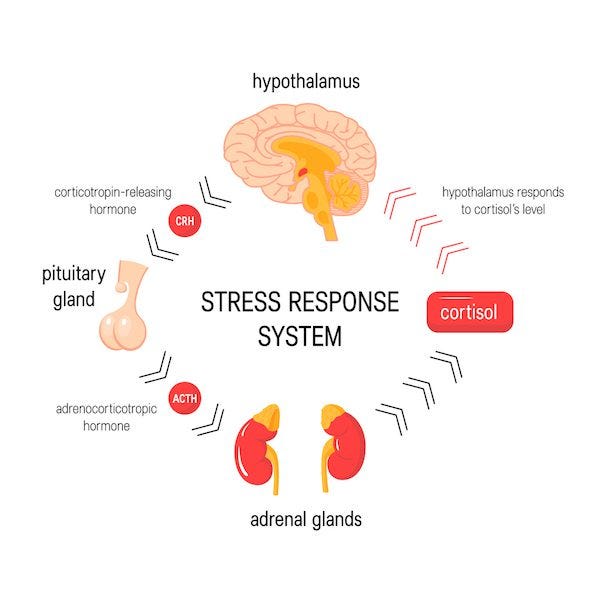Are You Tired of Dealing with Adrenal Overload?
Medically Reviewed by Dr. Parris Kidd
Are you struggling with exhaustion, body aches, or digestion problems? You may be dealing with adrenal issues.
If you feel tired all day, even after getting a good night’s sleep, it could be a sign that your stress load is more than what your adrenal glands can handle. Stress-induced adrenal overload is one of the most common, yet most overlooked, health problems today.
The adrenals are one part of an organ triad that helps the body cope with emotional stress: the hypothalamic-pituitary-adrenal (HPA) axis.
The HPA Axis
The HPA axis is the body’s main stress response system. It features functionally integrated nervous and hormonal cooperation to manage the body’s short-term (acute) and long-term (chronic) responses to stress.
The body’s initial response to stress begins in the brain. The zone called the hypothalamus is the first to process the sensations of stress. It stimulates the nearby pituitary gland, which in turn stimulates the adrenal glands’ outer zone – the adrenal cortex – to produce stress regulating hormones and release them into the bloodstream.
The HPA axis is comprised of the…
H – Hypothalamus, which is about the size of a pearl, is responsible for releasing hormones that prompt the pituitary gland to start secreting other hormones. Once it senses stress, this brain zone sends corticotropin-releasing factor (CRF) to the pituitary by way of direct nerve pathways.
P – Pituitary gland, a pea-sized organ located very close to the hypothalamus, is sometimes called the body’s “master gland” because its main job is to stimulate other glands to secrete hormones. Once alerted by the hypothalamus, the pituitary releases adrenocorticotropic hormone (ACTH) into the circulation. This soon reaches the adrenal glands and activates them to start producing cortisol.
A – Adrenal glands, a pair of triangle-shaped glands that sit on top of your kidneys, take center stage in your stress resilience, cognitive function, and hormone balance. They take their cue from the pituitary gland and are critically involved in your body’s reaction to stress. The adrenals produce the stress-response hormones adrenaline, dehydroepiandrosterone (DHEA), and cortisol.
The Stress Response

Maintenance of homeostasis in the face of stress requires activation of a complex set of nervous, hormonal, and immune system responses, collectively termed the stress response.
The stress response is both behavioral, via increased alertness and mental processing, and physiological, via increased breathing, heart rate, and energy generation.
Adrenaline
The fight or flight response is the body’s automatic, life-preserving response to stress. When you sense danger, your brain’s hypothalamus sends nerve signals to the adrenals, which immediately release a surge of adrenaline. This is the main rapid-response stress hormone: it quickly increases your heart rate and blood pressure and gives you a rush of energy to escape the danger.
As adrenaline kicks in, the heart beats faster, breathing and blood pressure increase, hands, and feet become cooler to shunt blood away from the extremities to the big muscles (to help you defend yourself or run away), and the pupils dilate (to help you see better).
This pattern of adaptation allows for survival in the short-term. But what happens when stress persists long-term?
Cortisol
Cortisol is the body’s long-term stress hormone. It releases glucose into the blood, as the main fuel for damaged tissues to make repairs. It also helps switch the body into survival mode, reducing non-essential functions, altering immune responses, and suppressing the digestive and reproductive systems.
DHEA
The hormone DHEA regulates immunity, helping maintain healthy inflammatory balance and overall alertness of the immune system. Among its many effects is helping sustain the efficiency of killer cells, which go after cells that are perceived to be damaged or foreign to your body.
Your body’s natural alarm system communicates with the area of the mind that manages mood, motivation, and fear. It helps you react fast and move toward safety. But when the perception of stress is maintained for months or even years, the stress response can become counter-productive.
Situational vs Ongoing Stress

The problem is, your body can’t differentiate between the various kinds of stress you experience. Whether it’s physical stress at the sight of a mountain lion, mental stress caused by working too many hours at your job each week, or emotional stress from dealing with a hormonal teenager or aggravating coworker or relative, your body reacts the same way: it pumps out loads of stress chemicals.
When running away from the feral cat, your body puts its fear chemicals to use, then once the danger is gone, it purges them from your system. After the danger passes, hormone levels subside, and the body’s heart rate and blood pressure return to normal. Once you’ve calmed down, your body processes the chemicals and flushes them out of your system.
A problem for many people is long-term stress: as they perceive stress day in and day out, it can disrupt many of their body’s life processes and eventually lead to a variety of health problems.
Ongoing stress causes sustained and unhealthy stimulation of the adrenals to make and release cortisol. Such long-term stress placed on the adrenals can lead to exhaustion of these glands, especially when combined with excessive consumption of caffeine, alcohol, or sugar.
Stress and the Brain
When stress becomes serious, the HPA axis gets stuck on high alert, and the brain tells the adrenals to keep releasing stress hormones. This may cause the adrenals to become depleted.
Long-term stress can impair the normal short-term stress response: the fight or flight hormone pattern can get stuck in the process of delivering blood to the muscles (which are still primed to help you run away). This can starve the brain of blood flow and eventually affect overall brain function, which can have a negative impact on your emotional well-being.
Unrelenting tension can also wreak havoc on gut health, depleting the friendly bacterial populations, some of which are involved in producing neurotransmitters such as serotonin and GABA.
How to Relieve Adrenal Overload
The key to minimizing the negative effects of severe stress is to maintain a healthy HPA axis and enhance your overall brain health. Here are 12 ways to help alleviate adrenal overload:
- Cut out lifestyle toxins – smoking, excessive alcohol consumption
- Reduce intake of sugar, artificial sweeteners, and caffeine
- Eliminate gluten
- Do moderate-intensity aerobic exercise
- Meditate or pray on a regular basis
- Practice gratitude
- Laugh more
- Support gut health with probiotics
- Optimize vitamin D levels
- Increase intake of omega-3 fatty acids, get your Omega-3 Index above 8 percent
- Take a science-based multiple that supplies vitamin C, magnesium, zinc, and the other essential vitamins and minerals
- Use adaptogenic herbals to better cope with stress: Panax ginseng, Rhodiola, ashwagandha, green tea, Relora® (Phellodendron + Magnolia), and holy basil
Use these tips to help improve your energy, cognition, and overall well-being.
At BrainMD, we’re dedicated to providing the highest purity nutrients to improve your physical health and overall well-being. For more information about our full list of brain healthy supplements, please visit us at BrainMD.
- This Is What You Need to Know About the Standard American Diet! -
- What Are the Pros and Cons of Western vs. Eastern Medicine? -
- Why Experts Say You Should Take Vitamin C, Vitamin D3 and Zinc -
- These Are Some of the Best Natural Herbs for Energy -
- What Are the Top Health Benefits and Types of Saunas? -



